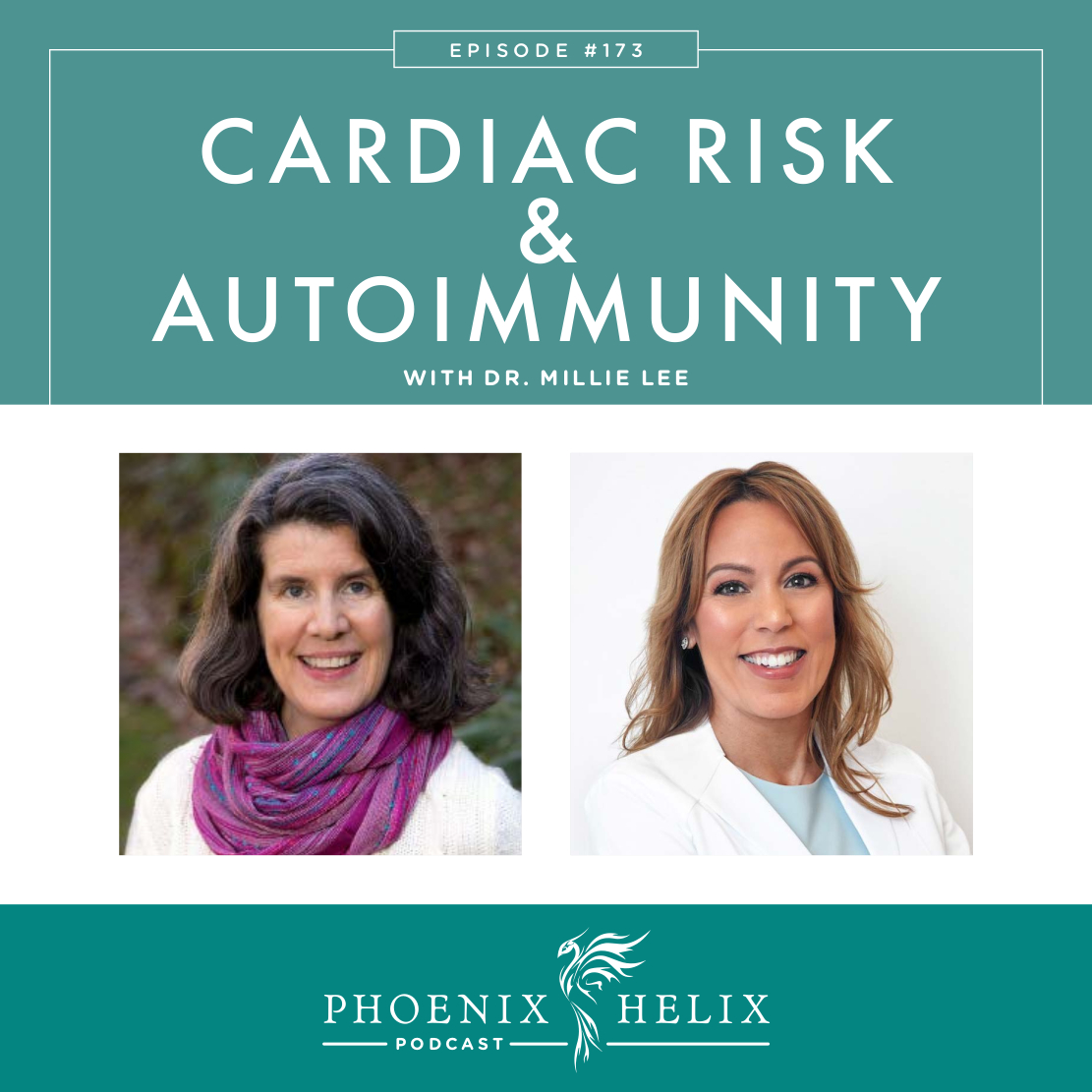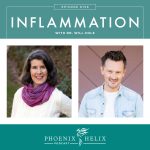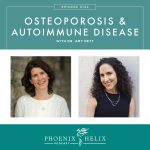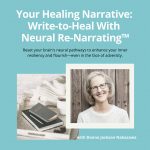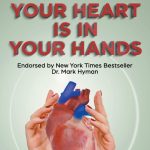The Connection Between Autoimmune Disease and Heart Disease
Research shows that people with autoimmune disease have a higher risk of developing heart disease than the general population, and heart disease is already the number one killer worldwide. What’s the cause of this connection? How can we minimize the risk? And if we already have cardiac problems, are they reversible? These are the questions we’ll be answering in today’s podcast. My guest is Dr. Millie Lee, an Integrative Cardiologist who believes preventing and reversing heart disease is possible. She’s also the author of the book, Your Heart Is In Your Hands.
Listen to the Show
- Subscribe to my podcast through your favorite podcast app: iTunes, Stitcher, Google, TuneIn, Spotify, Amazon, etc.
- You can also listen to the episode right here through the player below, and if you subscribe to my newsletter you’ll get notified of future episodes.
Podcast: Play in new window | Download
Show Notes
- Intro (0:00)
- Thank You to Our Podcast Sponsor – ShopAIP (1:51)
- Today, I’m highlighting their selection of AIP spice blends. Many spices are off-the-table during the elimination phase of the Paleo Autoimmune Protocol, but that doesn’t mean you can’t have flavorful food! Many herbs and spices are still allowed, and ShopAIP sells some wonderful blends! Primal Palate has a breakfast blend, a super gyro blend, and a garlic & herb. KC Naturals has a seasoned sea salt, an all-purpose meat and veggie seasoning, and a BBQ rub. Paleo Powder is another all-purpose herb blend. And Herbamare is the original seasoned salt that also happens to be AIP-friendly.
- ShopAIP is an online store dedicated to the Paleo Autoimmune Protocol. With hundreds of items for the elimination phase of the AIP, and new products labeled by reintroduction category as well. You can find protein bars, sauces and condiments, AIP-friendly spices, cooking and baking ingredients, delicious snacks, non-toxic skincare, and more.
- If you’re a first-time customer, use the code PHOENIX for 10% off your order. Purchase here.
- Meet Dr. Lee (3:22)
- Dr. Millie Lee is an Integrative Cardiologist and the author of the book, Your Heart Is In Your Hands.
- She fell in love with the heart in medical school and also found the idea that you could “fix” heart disease very exciting. And indeed, she did save lives in her work as a cardiologist, but she realized they often didn’t end up being healthy lives. The healthcare system was failing patients by not addressing diet and lifestyle. She also saw the limits of a system that treated body parts instead of the whole person. That inspired her to become an integrative cardiologist.
- What Is Integrative Cardiology? (5:31)
- Integration is the act of uniting seemingly different things.
- In her clinical practice, Dr. Lee looks at all of the systems of the body, not just the cardiovascular system, and how they all interact.
- She also looks at the mental, spiritual, and emotional aspects of health.
- And she integrates all therapeutic modalities that can help her patients on their healing journey, which may include everything from yoga to medication when necessary. But the first prescription every patient gets is a lifestyle prescription that addresses nutrition, movement, stress, and sleep.
- Cardiac Risk and Autoimmune Disease (8:09)
- On average, autoimmunity increases the risk of developing heart disease by 20%. This is because both heart disease and autoimmune disease are inflammatory conditions. In fact, some people consider heart disease an autoimmune disease.
- The three conditions most closely associated with cardiac risk are rheumatoid arthritis, lupus, and antiphospholipid syndrome. Cardiac conditions can present in a variety of ways, but the most common is coronary artery disease (build up of plaque in the arteries).
- Resource: Research Review.
- General Risk Factors for Heart Disease (10:23)
- Cigarette smoking
- High blood pressure
- Diabetes
- Cholesterol abnormalities
- Obesity
- Family history of heart disease
- Autoimmune-Specific Risk Factors for Heart Disease (11:48)
- Genetics
- Polyautoimmunity (having more than one autoimmune diagnosis)
- Familial autoimmunity (other people in your family having autoimmune disease)
- Duration and severity of disease
- If your autoimmunity is affecting multiple organs
- Long-term use of steroid medication
- Lab tests showing markers of chronic inflammation
- Antibodies associated with cardiovascular disease (anticardiolipin and antiphospholipid)
- Research: Cardiovascular Involvement in Autoimmune Diseases
- The Heart Matrix: Root Causes of Heart Disease (14:16)
- Inflammation (fire)
- Digestive disturbance (earth)
- Insulin resistance (water)
- Stress (air)
- Genetics/Epigenetics (space)
- Unsurprisingly, these are also root causes of autoimmune disease. They’re also the areas we can intervene to improve our health. Because they are all connected, when you work on one area, it can have a positive impact on all areas.
- Tests to Assess Cardiac Risk (17:12)
- Heart disease can be silent, meaning there are no symptoms. So, tests are important in the prevention and reversal of heart disease. Below are the tests Dr. Lee uses in her practice.
- Advanced Lipid Profile – in addition to looking at total LDL, HDL, and triglyceride numbers, this test notes the number and size of LDL particles as well as a special type of LDL called lipoprotein(a). These are more accurate measures of cardiac risk.
- Inflammation markers: C-reactive protein and oxidized LDL.
- Functional medicine tests: cortisol levels, hormone levels, nutrient levels, and gut health testing.
- For people with moderate (or higher) risk, she may recommend a CIMT (ultrasound of carotid artery in neck) and potentially a CAC (heart CT scan).
- She rarely does genetic testing because it can be expensive and isn’t covered by insurance. However, if someone has done basic 23andMe testing, that data can be helpful. The ApoE4 gene can be predictive of both cardiac risk and Alzheimer’s risk, and 23andMe does include that genetic test. ApoE can also be tested via a blood test.
- Cholesterol Myths vs. Truths (24:54)
- Myth #1: Cholesterol is evil. The truth is that cholesterol is essential to life. It’s an integral part of every cell membrane and the building block of many important hormones, including estrogen, testosterone, and vitamin D. It’s also essential to brain health.
- Myth #2: High LDL cholesterol leads to heart attacks. The truth is that most heart attacks happen to people with normal LDL cholesterol levels.
- Myth #3: Conventional lipid profiles catch all cholesterol abnormalities. It’s true that cholesterol is a component of artery plaque, but there are many factors at play. That’s why the advanced lipid profile is so important. Having more small LDL particles than large increases risk. High numbers of lipoprotein(a) also increases cardiac risk.
- Myth #4: Dietary cholesterol increases blood cholesterol. Actually, research shows that this link is very weak. The combination of fats + refined carbohydrates is a greater risk factor. Sugar is the worst offender, increasing triglycerides, lowering HDL (the “good” cholesterol), and contributing to insulin resistance. Note: natural sugars can have this effect too when consumed in high quantities.
- Thank You to Our Podcast Sponsor – Your Healing Narrative – an Online Course by Donna Jackson Nakazawa (32:50)
- Did you know that trauma increase the risk of both autoimmune disease and heart disease? Research shows that people with PTSD are 30-40% more likely to be diagnosed with autoimmune disease. And cumulative trauma exposure increases the risk of heart attack, stroke, and congestive heart failure as well. It’s not surprising, given the topic of today’s episode, but thankfully this isn’t where the story needs to end.
- Trauma can wire our brains into a default inflammatory response, increasing our risk of a wide variety of medical conditions. Thankfully, there are things we can do to rewire our brains for health and build resilience back into our lives. That’s what this online course is all about. Donna calls this Neural Re-Narrating™.
- If you aren’t familiar with Donna’s work, she’s one of my most popular podcast guests. She is an award-winning science journalist and the author of six books. Her expertise is the science of the mind-body connection and how to harness it for health. She also has autoimmune disease herself, so she understands this experience from the inside out.
- This class includes 8 lessons with over 100 activities. It includes video, audio, and written resources and exercises. It’s also self-paced so you can start today!
- Learn more through her website: DonnaJacksonNakazawa.com, and save $30 with the code PHOENIX30. Purchase here.
- Saturated Fats Controversy (35:05)
- Saturated fats remain controversial because nutrition studies are notoriously difficult to interpret. No one eats a nutrient in isolation. Eating saturated fat as part of a Standard American Diet would have a different effect than eating saturated fat within a nutrient-dense diet. Dietary fats are also a blend more than one type, depending on the food source, and even among saturated fats there are different types with different effects. Lastly, there’s bio-individuality. Each person may metabolize fats differently based on many factors.
- Population studies have found no correlation between saturated fat intake and cardiovascular disease.
- However, saturated fats may be pro-inflammatory. Right now, the research is unclear, but since this is a possibility and inflammation is a root cause of heart disease and autoimmune disease, Dr. Lee recommends moderation.
- Dr. Lee’s Top 3 Recommended Dietary Fats (40:36)
- Extra-Virgin Olive Oil
- Avocados
- Seafood (for their omega-3 fatty acids)
- HeartMath & Cardiac Yoga (43:03 & 48:04)
- Both are relaxation techniques that can help build resilience against stress.
- Cardiac Yoga is designed for people with chronic cardiac conditions or people recovering from a heart attack. It’s usually taught 1:1 or in a small group class.
- HeartMath is a heart-focused meditation, combined with biofeedback. Heart rate variability is the beat-to-beat changes in our heart rate. Some rhythms are associated with stress, anxiety, and anger. Other rhythms are associated with relaxation, joy, and gratitude. HeartMath has a smartphone app that allows you to measure your own rhythm, and then use the Heartmath technique to generate a smooth rhythm.
- Reversing Heart Disease (43:03 & 51:36)
- It is possible. The first study to show this was the Ornish Study. He implemented a 4-part program with patients with heart disease. They implemented a low-fat vegetarian diet, 1 hour of walking daily, stress management, and group therapy. After 1 year, not only had their disease progression been halted, it had also reversed, and 5 years later, there were further improvements. This program is now approved by Medicare and offered in many hospitals as part of their cardiac rehab program.
- Since then, there have been multiple studies showing other diet and lifestyle interventions can reverse heart disease. The Mediterranean diet is the one most commonly studied, and it shows great benefit as well.
- Dr. Lee has seen great changes in her clinical practice as well. Her patients are very motivated to make positive diet and lifestyle changes. Many experience improved lipid profiles, lowered inflammation, higher levels of energy, weight loss, better sleep, and reduced medication.
- Supplements (56:19)
- Dr. Lee prescribes supplements based on each patient’s unique symptoms, risk factors, and test results.
- Most of her patients take omega-3 fatty acids, because they aren’t getting enough through their diet.
- Many people are deficient in vitamin D, so she’ll test for that and prescribe if needed.
- If someone has high cholesterol or high blood pressure, she often recommends CoQ10.
- If inflammatory markers are high, she may recommend curcumin.
- If cholesterol is high, she may recommend bergamot and/or berberine.
- If lipoprotein(a) is high, niacin may be helpful.
- Outro (58:23)
- Dr. Millie Lee is accepting new patients. She has an in-person practice in New York City, and a telehealth practice where she consults with people around the world. She’s also the author of the book, Your Heart Is In Your Hands.
- Eileen (your podcast host) is the author of multiple books, written to help people thrive with autoimmune disease. Learn more on the Books Page.
- If you like this podcast, follow or subscribe through your favorite podcast app. You can also subscribe to Eileen’s biweekly newsletter.
- Check out the entire archive of podcast episodes.
You May Also Be Interested In
Spreading the Word
If you like the podcast, please leave a positive review in iTunes. It would mean the world to me, and also helps others find the podcast. Here are some quick instructions using your iPhone:
- If you are already subscribed to my podcast: (1) Click the purple podcast icon. (2) At the bottom of the screen, click Library. (3) At the top of the screen, click Shows. (4) Click the Phoenix Helix podcast image. (5) Scroll down the page, and you’ll see Ratings and Reviews. Scroll down a little bit more and click on Write a Review. This will bring up the review screen. Tap 5 stars (if you love the podcast), and then click in the title box, and it will bring up the keyboard. Enter a title and short review. (6) Click Send in the upper right corner. (7) Thank you! Positive reviews give the podcast a higher search ranking in iTunes, helping people find it and letting them know it’s a quality podcast and worth their time to listen.
- If you haven’t subscribed to my podcast: (1) Click the purple podcast icon. (2) In the lower right corner, click the magnifying class. (3) Type Phoenix Helix in the search box. (4) Click the podcast cover in the Show list. (5) If you’d like to subscribe, click the + sign at the top of the screen. (6) To write a review, scroll down the page, and you’ll see Ratings and Reviews. Scroll down a little bit more and click on Write a Review. This will bring up the review screen. Tap 5 stars (if you love the podcast), and then click in the title box, and it will bring up the keyboard. Enter a title and short review. (7) Click Send in the upper right corner. (8) Thank you! Positive reviews give the podcast a higher search ranking in iTunes, helping people find it and letting them know it’s a quality podcast and worth their time to listen.

